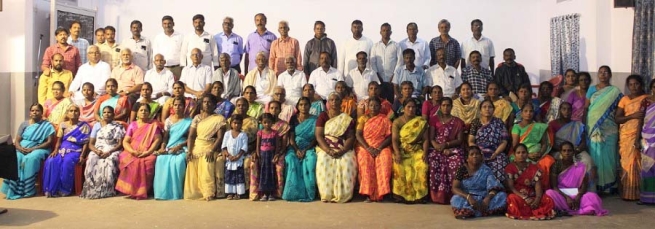The symposium commenced with an introductory address, followed by a prayer led by the parish priest. Participants engaged in discussions centered on the key themes of Vatican II, focusing on the transition from a clergy-centred Church to a more laity-centred community. One main objective was to emphasise that every parishioner plays a vital role in the Church's mission, not just priests and religious members.
Fr Jesudoss Periyanayagam, the director of Deepagam, highlighted in his keynote address the ongoing relevance of the Vatican II documents, emphasising that despite the passage of sixty years since the Council, many of its visions remain unrealised. The discussions included reflections on the 21 Ecumenical Councils and the challenges they addressed, setting the stage for a deeper understanding of Vatican II.
Participants explored the misconceptions that existed prior to Vatican II, particularly regarding the nature of God and the Church. Historically, the Church was viewed as separate from the world, focusing on its spiritual aspects while neglecting the realities of daily life. This perspective fostered alienation between the Church and society, leading to stagnation and divisions within the community.
The symposium also sought to redefine the Church’s role in the modern world. It was argued that the Church must engage more deeply with societal issues, encouraging dialogue and collaboration with different sectors of society. Participants recognized that the Church should not adopt a superior attitude but instead strive for inclusivity and connection with the world.
A scientific perspective was introduced, discussing the relationship between humanity and spirituality. The idea that energy is neither created nor destroyed was likened to God's continuous creation, reinforcing the notion that humanity collaborates with God in the divine plan. This relationship is foundational to understanding the Kingdom of God, revelation, and God's overarching plan for humanity.
Throughout the symposium, the need for inculturation was emphasised, urging participants to interpret the Word of God in light of contemporary realities. The closing remarks underscored that the Church is a pilgrim community, journeying toward fulfillment in God while remaining engaged with the world around it.
The event included workshops where participants discussed Vatican II themes in small groups. They expressed a collective desire for a vision of a new heaven and earth, emphasizing the importance of fulfilling God's will and sharing in His plan. Participants highlighted the need for active participation in politics, personal and family prayer, and a greater understanding of the Vatican II teachings. They also articulated a commitment to proclaiming Christ to non-Christians and fostering equality within the Church.
Appreciation was voiced for the use of vernacular languages in liturgy and for promoting gender equality in religious practices. The need for love and affection as fundamental Christian values was recognized, alongside the importance of supporting the Church's challenges with solidarity.
The symposium concluded with reflections on the discussions, emphasizing the importance of family love, equality in community activities, and the active involvement of laity in the Church. There was a strong consensus that the Church should be inclusive and accessible to all, not just clergy.
The event provided a platform for participants to engage deeply with the teachings of Vatican II, fostering a renewed commitment to living out these principles in their communities. A simple fellowship meal was shared among attendees, further strengthening the sense of community and shared purpose.
Overall, the symposium served as a vital step in bringing the spirit of Vatican II to the local faithful, empowering them to take an active role in the Church's mission and encouraging a collective journey toward a more inclusive and engaged ecclesial community.
-
 Title
Title
Title
Title
-
 Title
Title
Title
Title
-
 Title
Title
Title
Title
-
 Title
Title
Title
Title
-
 Title
Title
Title
Title
-
 Title
Title
Title
Title
-
 Title
Title
Title
Title
-
 Title
Title
Title
Title
-
 Title
Title
Title
Title
-
 Title
Title
Title
Title
-
 Title
Title
Title
Title
-
 Title
Title
Title
Title
https://www.infoans.org/en/component/k2/item/22921#sigProId1205b308f8


